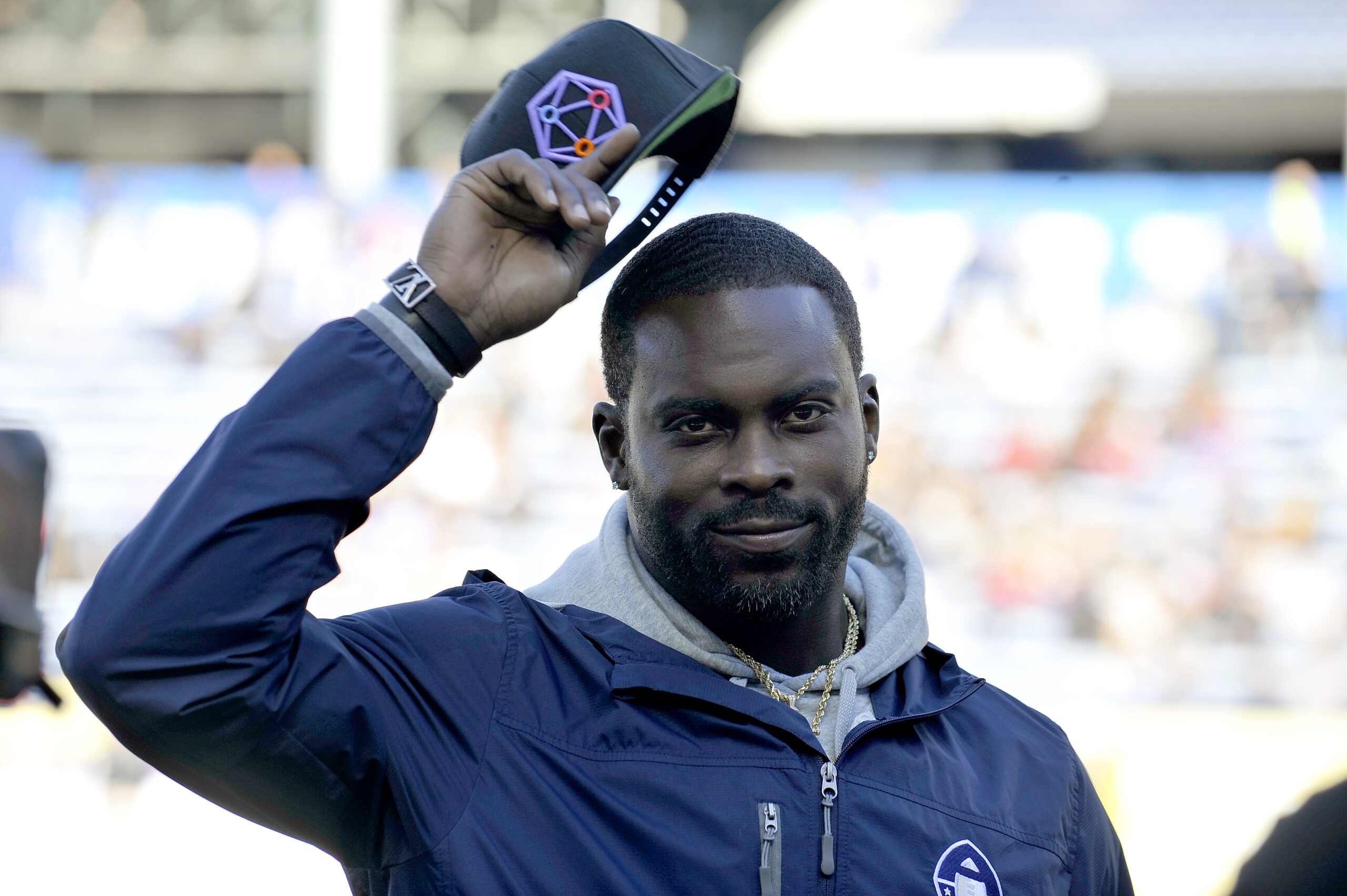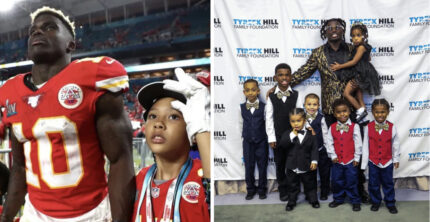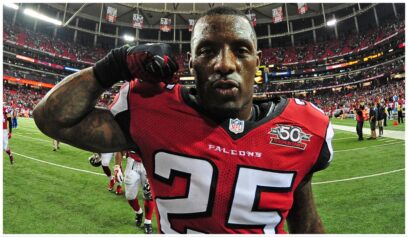“I changed the game.”- Michael Vick on why he should be in the Pro Football Hall of Fame.
There are few that sit at the helm of culture.
There are names which cause lines to be drawn, forcing some to accuse, criticize, attack and vilify, and others to defend, support, cheer and celebrate. They are polarizing figures who incite emotion and reaction because of what they do and mean.
They are people recognized by single words or nicknames instead of their full names. Martin, Malcolm and Obama. Ali, Dr. J., Magic, MJ, Serena, Venus, Tiger and AI. They are names synonymous with culture, descriptive without explanation. They are all lightning rods for hate, resentment, love and admiration. And with his retirement announcement on Friday, we discuss another: Vick.
Leaders of culture elicit a multitude of reactions, both good and bad, and aside from President Obama, Michael Vick is one of the most recent, and best, examples of this occurrence.
Vick was the first pick of the 2001 NFL Draft by the Atlanta Falcons, who, like the rest of us, couldn’t stop the “oooing” at the sights of what he did in his two years at Virginia Tech. As a redshirt freshman in 1999, he led the Hokies to an undefeated record of 11-0 and finished third in the Heisman voting behind Ron Dayne and Joe Hamilton. But it was against Florida State in the 2000 Sugar Bowl that year, where he he passed for 225 yards, accounted for two TDs and shredded the Seminoles for 97 yards rushing, where he put the nation on notice that he was a force to be reckoned with on the gridiron.
I remember watching his performance that day and thinking that he was a human video game, cutting and juking the entire Seminoles D into missed tackles and broken ankles. Although they lost the game to the eventual National Champs, Vick, Coach Beamer and the Hokies had arrived on the national stage. And in the process, #7 let it be known that he was going to be something very special.
In his sophomore season, Vick displayed more of his incredible talent, destroying the Boston College Eagles with 210 yards rushing before missing two games with an injury. And although the team couldn’t duplicate their success from 1999, Vick did more than enough to capture the attention of the Falcons, who used the number one overall pick on the Newport News, Virginia native.
He was the first African American quarterback to be selected with the first pick in the NFL Draft.
His mesmerizing talent made him must-see TV, and being under center for the Falcons made him a new folk hero for Black America. The 4.3 speed, the laser arm, the cool, laid back demeanor and the way he ran through defenses made us react like we were Craig and Smokey on the front porch. Even more amazing is the fact that he was right-handed yet threw with his left hand, and threw rockets to the point where coaches had to ask him to take some steam off of his passes as he was hurting the hands of his receivers.
He was the new breed Black QB and we celebrated, cheering for him to become the first African-American under center to win a Super Bowl since Doug Williams. Plying his craft in the city of Atlanta, a rapidly growing city which was becoming a new home for urban culture and lifestyle, was the perfect setting for his talents.
Many Black New Yorkers had been re-locating down to Atlanta en mass since the ’90s due to its favorable cost of living and overall quality of life. The music scene exploded, blessing us with artists such as Ludacris, Usher, TLC, Outkast and Jermaine Dupri’s “So So Def” label, and the sports teams always seemed to be doing well yet could never quite take the step into greatness.
The Hawks and the Braves had talent, but couldn’t achieve elite status. The Falcons had cultural appeal with Deion, Andre Rison and the Dirty Bird, but it wasn’t until Michael Vick arrived on the scene in 2001 that eyes really shifted to the ATL.
Vick quickly become a fan favorite across the nation, eventually signing deals with Nike and EA Sports; the Madden 2004 game, which featured him as the cover image, showcased his talents, basically making him unstoppable and banning the Falcons from being used in many households during Madden matches.
Mike Vick in Madden ’04 was a straight up cheat code. pic.twitter.com/U2XQfinNg6
The Shadow League (@ShadowLeagueTSL) February 3, 2017
That same year he also became the game’s highest paid player, signing a 10-year, $130 million contract. His name was in rap lyrics and he was popping up in rap videos, Lil Wayne going so far as to say that without Vick in a rap video at that time, the video wasn’t considered “cool.”
He had it all. Fame, fortune, fans, a great team and a great city, and we all loved him. He had the right persona and the right tone. He had the tight braids, the diamond earrings, the skull cap and the one strap on the chin strap hanging loose, always reminding us that he had flavor and swag.
Vick’s emergence changed the game and ushered in a new form of Black QB for the culture to appreciate, one that just felt different than the ones we saw in the past. I grew up watching legendary names like Jamelle Holieway, Don McPherson, Major Harris, Michael Bishop and Tommie Frazier – guys who could run, pass and lead their teams to victories.
But Vick was different, especially in the NFL. He was like Randall Cunningham at warp speed and with a Hip-Hop feel to him. He brought an immeasurable quality to the league that we hadn’t seen before, which made him even more special. He didn’t rap like Deion or some of the other athletes trying to break into the music business, but his essence was pure Hip-Hop, and that’s what endeared him to the culture.
But then 2007 hit, the infamous dog fighting scandal broke and Vick was sent to prison. It’s instances like these, particularly legal ones, where the polarization of our cultural heroes occurs, and Vick was in no way immune.
Muhammad Ali faced the same type of polarizing situation when he refused to be drafted to fight in the Vietnam war. He faced legal battles, racism and general hatred. But he also had his supporters, particularly those in Black America, who would not let Ali be destroyed.
I am not comparing the impact and significance of Ali to Vick, but the polarizing situations they faced as the elevated faces of the culture were similar. The criticism and support. The venom and excitement. The hatred and love. Their success and actions brought them all of these things, and their lives will always be recognized for having them. And they both were able to triumph after their legal battles to succeed both in and outside of their respective fields of play, Ali re-capturing his world titles and Vick getting another shot with, and another big contract from, an NFL team (the Eagles).
Our cultural icons always come with a yin-yang quality which makes them polarizing, and if you hate/love them, chances are that you will always hate/love them. Animal lovers will never forgive Vick for his criminal actions against dogs and his supporters will always have his back. That’s just the way it is. But reading that he was finally retiring from the NFL made me reflect back on his impact and importance, and there’s no denying that he had both.
The dog lover in me hates what he did, but the man and sports fan in me forgave him and believed that he deserved a second chance after serving his time. The man of color that I am will support Vick for what I’ve seen him do both on and off the field. Speaking with people about his wrongs, taking care of his mother, family and friends, seeing how loved he is by those that know him and seeing how he doesn’t shy away from the drama he caused makes me think about all of those days we spent watching him on the gridiron, running circles around opposing defenses while throwing pure lasers from his left arm.
Just like fellow Newport News, VA native Allen Iverson, we cheered and celebrated #7 for what he represented and for being himself. And we continue to support and defend him despite the hate that follows him around.
As a player, Vick still holds two NFL records; most career rushing yards by a QB (6,109) and most rushing yards by a QB in a season (1,039). He was voted to the Pro Bowl four times and won the NFL Comeback Player of the Year Award in 2010. It’s a shame that the Falcons didn’t win the Super Bowl this past Monday, as you just had the feeling that he would have been part of that Super Bowl victory, and I feel they would have honored #7 in some way if they had held on to the lead and hoisted the Lombardi Trophy.
Michael Vick might not be Hall of Fame bound, but he did change the game and he meant, and still means, something significant to all. To me, that makes him a cultural icon.






